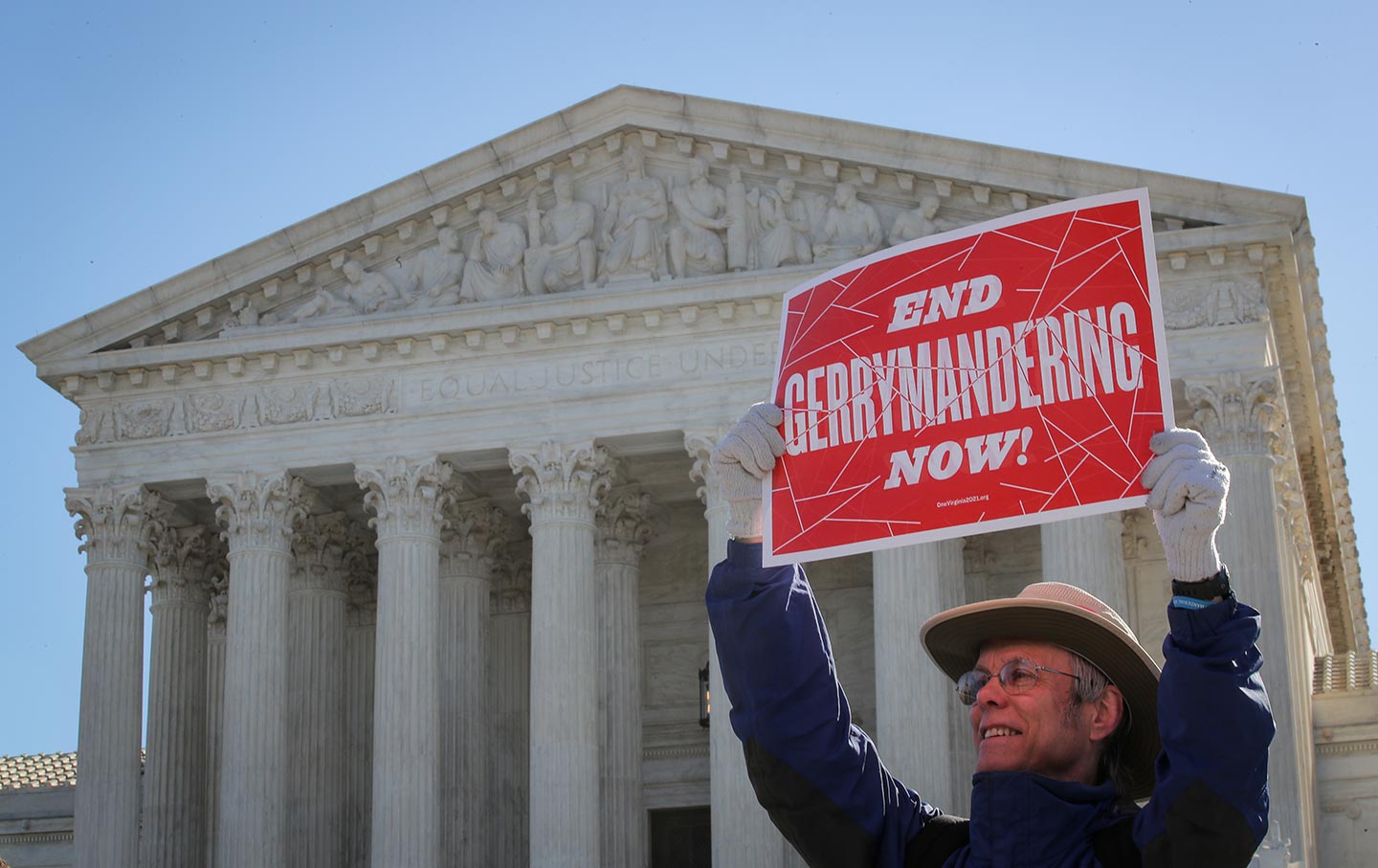Republican Senators Are a Bigger Threat to the Constitution Than Trump
Senators who are supposed to check Trump’s abuses are supporting his immunity claims instead.

Senator Steve Daines (R-MT) listens during a news conference following a Senate Republican policy luncheon at the US Capitol on March 20, 2024.
(Anna Moneymaker / Getty Images)Donald Trump may talk about wanting to act as “a dictator” if he wins a second term. But what Trump really wants is to be a king. The ousted former president’s demand that he be granted absolute immunity from prosecution for his many crimes—including a direct attack on American democracy that US Representative Bennie Thompson, the Mississippi Democrat who chaired the House committee on January 6, correctly identified as a “sprawling, multi-step conspiracy” which led to an “attempted coup”—is radically at odds with the intentions of the founders of the American experiment.
Trump’s interpretation of the US Constitution, a document he has never understood or respected, would jettison historic constraints on the presidency that were designed to assure that the fledgling United States would not become a mirror image of the monarchy the revolutionaries of 1776 fought against. Yet, as wrongheaded as Trump’s attempt to reinterpret the Constitution may be, the determination of key Republicans in the Senate—as well as their election arm—to support the former president’s infamy is even more un-American. And even more dangerous.
In March, the National Republican Senatorial Committee and its powerful chairman, Montana Senator Steve Daines, filed an amicus brief with the Supreme Court in support of Trump’s presidential immunity appeal. Spinning an elaborate legal fantasy regarding the supposed perils of allowing presidents and former presidents to be held to account for criminal wrongdoing, the brief alleged that a failure to uphold Trump’s expansive claims to immunity would “incapacitate every future President with de facto blackmail and extortion while in office, and condemn him to years of post-office trauma at the hands of political opponents.”
Lawyers for Daines and the NRSC were actually more over-the-top in the advocacy for presidential immunity than Trump’s legal team, as the committee and its chair argued that a D.C. Circuit Court decision to reject Trump‘s immunity claim is “akin to a loaded gun lying on the table that future litigants can now wield against presidents (and former presidents) of all political persuasions.”
That’s absurd. The lower-court ruling, which Trump is trying to get his allies on the Supreme Court to overturn, simply upheld the standards that have long been accepted with regard to presidential accountability.
Of course, Trump wants to gut those standards. He has always advocated for an imperial presidency. If he gets a second stint in the White House, democracy and its constitutional safeguards would be threatened—no matter what the high court decides.
But the signal from Daines is an ominous one, as it seeks to boost Trump by undermining the basic premises of America’s system of checks and balances. That would be troubling coming from any senator. But it’s especially concerning in this case, as the senator from Montana has been widely identified as Trump’s favored prospect to replace retiring Senate Republican majority leader Mitch McConnell. Daines can’t show his hand and openly bid for the leadership post while he is chairing the NRSC, as doing so would suggest that he’s more focused on himself than on winning back control of the Senate for the GOP. But Axios suggests, correctly, that “he could become a serious contender overnight if Senate Republicans pick up a multi-seat majority and Trump wins at the top of the ticket.”
Where McConnell has rejected the most extreme arguments for unrestricted presidential immunity (a low bar to clear, but still), Daines embraces them—going so far as to provide legal support for Trump’s court fight.
And he is not the only Senate Republican who is prepared to give Trump a blank check.
Texas Senator Ted Cruz has responded to indictments of Trump for criminal wrongdoing by saying, “I think this is an abuse of power and a persecution of President Trump.” Senator Marco Rubio of Florida used a March appearance on ABC’s This Week to defend Trump’s immunity claim.
“Do we want to live in a country where basically the opponents of a president can extort them, can have leverage over them during their entire presidency and say, ‘Don’t worry, once you’re out of office, we’re going to prosecute you, we’re going to come after you, we’re gonna charge you for this crime’?” asked Rubio, who has been tipped as a potential running mate for Trump on this fall’s Republican ticket.
The answer to each of those questions should be “yes.” We ought to want our presidents to feel constrained, to worry about consequences, to think twice before they act. It’s absurd to refer to the threat of accountability as “extortion.” If a president is thinking about committing a crime, he or she should fear repercussions. It shouldn’t be controversial to argue that politicians and prosecutors ought to use whatever leverage is available to prevent the most powerful person in the country from breaking the law.
What’s scary is that Republicans who could be in charge of the US Senate come January 2025 are enthusiastically backing Trump’s efforts to close down another avenue for presidential accountability. These same Republicans refused to convict Trump at the close of his impeachment trial for the high crimes and misdemeanors he committed on and around January 6. Back in 2021, McConnell justified his opposition to voting to convict Trump during his second impeachment by claiming that the impeachment process was “never meant to be the final forum for American justice.”
“President Trump is still liable for everything he did while he was in office,” asserted McConnell, who said that Trump “didn’t get away with anything yet.”
Popular
“swipe left below to view more authors”Swipe →What ought to unsettle Americans as much or more than Trump’s royal impulse is the fact that Daines, who could well be McConnell’s replacement, is advocating for a future in which constitutional guardrails are removed and an unaccountable Donald Trump could get away with everything. That would mark the end of checks and balances, and the beginning of presidential monarchy.
Disobey authoritarians, support The Nation
Over the past year you’ve read Nation writers like Elie Mystal, Kaveh Akbar, John Nichols, Joan Walsh, Bryce Covert, Dave Zirin, Jeet Heer, Michael T. Klare, Katha Pollitt, Amy Littlefield, Gregg Gonsalves, and Sasha Abramsky take on the Trump family’s corruption, set the record straight about Robert F. Kennedy Jr.’s catastrophic Make America Healthy Again movement, survey the fallout and human cost of the DOGE wrecking ball, anticipate the Supreme Court’s dangerous antidemocratic rulings, and amplify successful tactics of resistance on the streets and in Congress.
We publish these stories because when members of our communities are being abducted, household debt is climbing, and AI data centers are causing water and electricity shortages, we have a duty as journalists to do all we can to inform the public.
In 2026, our aim is to do more than ever before—but we need your support to make that happen.
Through December 31, a generous donor will match all donations up to $75,000. That means that your contribution will be doubled, dollar for dollar. If we hit the full match, we’ll be starting 2026 with $150,000 to invest in the stories that impact real people’s lives—the kinds of stories that billionaire-owned, corporate-backed outlets aren’t covering.
With your support, our team will publish major stories that the president and his allies won’t want you to read. We’ll cover the emerging military-tech industrial complex and matters of war, peace, and surveillance, as well as the affordability crisis, hunger, housing, healthcare, the environment, attacks on reproductive rights, and much more. At the same time, we’ll imagine alternatives to Trumpian rule and uplift efforts to create a better world, here and now.
While your gift has twice the impact, I’m asking you to support The Nation with a donation today. You’ll empower the journalists, editors, and fact-checkers best equipped to hold this authoritarian administration to account.
I hope you won’t miss this moment—donate to The Nation today.
Onward,
Katrina vanden Heuvel
Editor and publisher, The Nation
More from The Nation

How Rob Reiner Tipped the Balance Against Donald Trump How Rob Reiner Tipped the Balance Against Donald Trump
Trump’s crude disdain for the slain filmmaker was undoubtedly rooted in the fact that Reiner so ably used his talents to help dethrone him in 2020.

The Economy Is Flatlining—and So Is Trump The Economy Is Flatlining—and So Is Trump
The president’s usual tricks are no match for a weakening jobs market and persistent inflation.

Trump’s Vile Rob Reiner Comments Show How Much He Has Debased His Office Trump’s Vile Rob Reiner Comments Show How Much He Has Debased His Office
Every day, Trump is saying and doing things that would get most elementary school children suspended.

How the Groypers Hope to Remake Trump's GOP How the Groypers Hope to Remake Trump's GOP
The perilous politics behind the elevation of Nick Fuentes.




